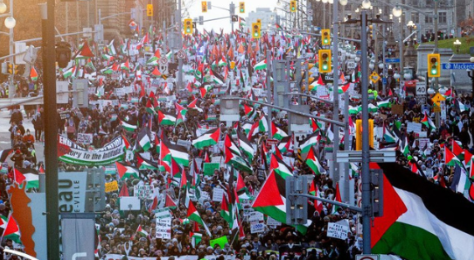Canada’s municipal “bubble zone” bylaws disproportionately target pro-Palestinian protests and undermine Charter-protected freedoms. These bylaws reveal a troubling trend: under the guise of public safety, Canadian cities like Vaughan and Brampton are enacting sweeping bans on demonstrations near places of worship, schools, and community centres. These measures are overwhelmingly applied to silence criticism of Israel’s genocide in Gaza and Canada’s complicity.
These laws are not about ensuring public safety – they’re about silencing dissent. Municipalities are misusing vague terms like ‘nuisance demonstrations’ to criminalise peaceful protests, even though laws already exist to address genuine harassment or violence. This is a clear double standard aimed at protecting pro-Israel institutions from public scrutiny.
Reacting on the municipal bylaw, CJPME highlights key findings:
Charter Violations: Bubble zones impose excessive spatial restrictions (e.g., 100-metre bans), chilling free expression and peaceful assembly. Legal experts warn that these measures fail constitutional scrutiny.
Selective Enforcement: Pro-Palestine protests are routinely framed as “hateful” or “antisemitic” to justify crackdowns.
Political Motivations: Pro-Israel lobby groups have pushed these laws, conflating criticism of Israel with antisemitism to legitimise censorship.
The Anti-Racism Programme of the CJPME Foundation (ARPCF) has urged all levels of government to:
Repeal or Revise Bubble Zone Bylaws – Existing bubble zone bylaws should be repealed or substantially revised to ensure they do not infringe upon Charter-protected freedoms, including freedom of expression and peaceful assembly.
End Suppressive Zoning Practices – Governments must halt the use of zoning laws as tools to restrict or suppress political protest, particularly when such protest is peaceful and constitutionally protected.
Affirm Legitimacy of Pro-Palestinian Expression – Public institutions should recognise and affirm that pro-Palestinian advocacy is a valid and lawful form of political dissent, not a security threat.
Uphold Charter Rights Equally – All levels of government must act to protect the rights of individuals to speak out against war crimes and systemic injustice, rather than criminalising or marginalising such voices.
Reject Censorship of Dissent – Silencing peaceful political expression, especially in response to global human rights concerns, is both unconstitutional and ethically indefensible in a democratic society.
Canada cannot claim to uphold human rights while enabling Israel’s genocide in Gaza – or punishing those who protest it. These laws set a dangerous precedent: if municipalities can ban protests near places hosting illegal settlement fundraisers, what stops them from shielding corporations or governments from scrutiny next?
OCHU-CUPE has also condemned Ottawa mayor’s push for ‘bubble zone’ by-laws. The union representing about 10,000 hospital and long-term care staff in Ottawa vowed to fight Mayor Sutcliffe’s plan to create ‘bubble zones’ that would prevent health care workers from exercising their charter rights and organising demonstrations outside their workplaces.
“We have a constitutional right to protest, and it must not be taken away,” said Michael Hurley, president of CUPE’s Ontario Council of Hospital Unions, OCHU-CUPE, which represents 50,000 health care staff across the province.
“Health care workers already have limitations on their rights to strike and to refuse unsafe work. Demonstrations are one of the few tools our members have to hold employers and the government accountable, and to raise public awareness about cuts that affect the quality of patient care, privatisation of health services, funding, health and safety of staff, and other issues.”
The union – which represents a predominantly female and disproportionately racialised workforce – has organised hundreds of protests over the years on a range of issues in the public interest.
On May 16, 2025, Canadian Civil Liberties Association (CCLA) and the Centre for Free Expression sent a letter to Toronto City Councillors, urging them to vote against a proposed bubble zone bylaw that would prohibit peaceful protests near social infrastructures.
“Working toward a more inclusive and equal society is a goal both our organisations share. It is also one that the government must pursue without unreasonably and unjustifiably infringing on fundamental freedoms. In this regard, we acknowledge the care with which the municipal staff have drafted the Proposed Bylaw, which is less rights-infringing than other bylaws recently adopted in other municipalities.
“Having said that, our position remains that this bylaw represents a significant risk to peaceful expression and assembly, and on balance is not necessary in light of the already-existing police powers.
“The public consultation conducted by the City itself shows that the majority of the population does not consider a bubble zone by law to be necessary. This popular position is consistent with the Proposed Bylaw’s legal implications.
“The text of the Proposed Bylaw clearly states that its purpose is to prevent access to certain community infrastructure from being impeded. However, the police already have broad powers to protect access to property and to intervene in the event of a threat to human physical safety, including during protests. Therefore, a new bylaw is simply unnecessary – as acknowledged by Toronto’s very own police service.”




